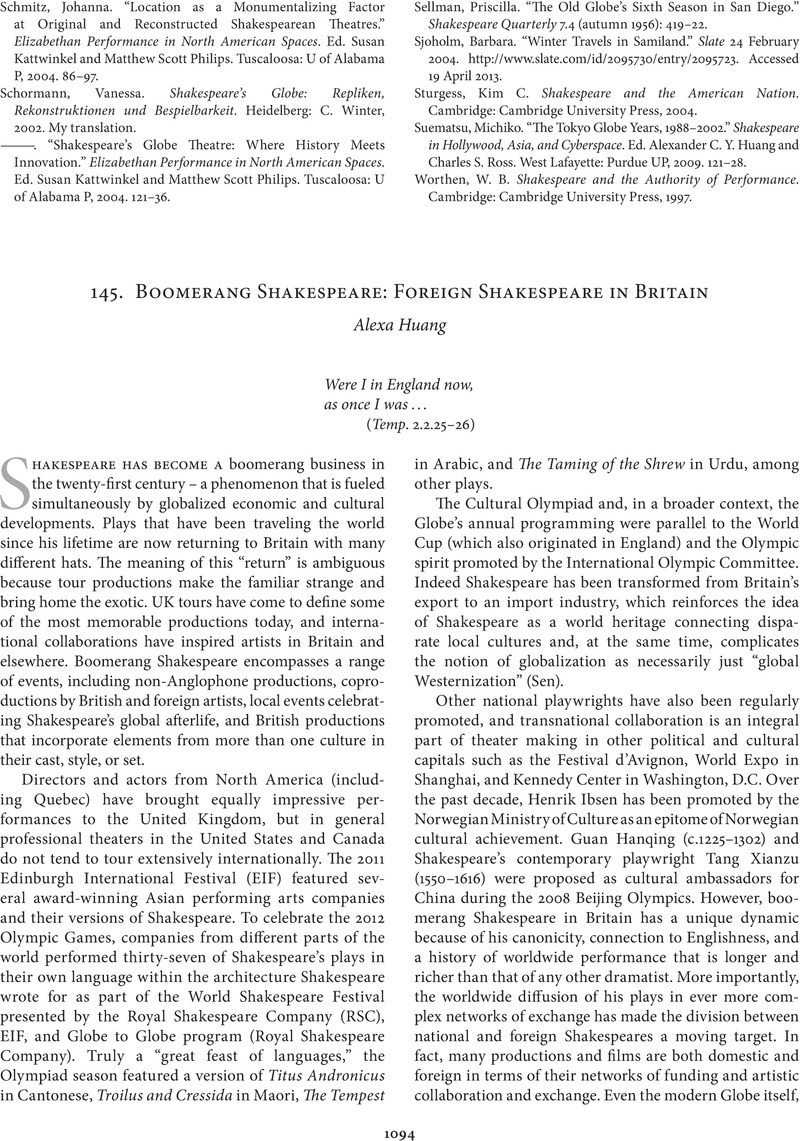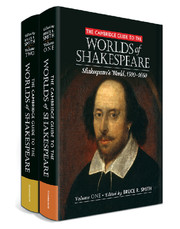Book contents
- The Cambridge Guide to the Worlds of Shakespeare
- Frontispiece
- Frontispiece
- The Cambridge Guide to the Worlds of Shakespeare
- Worlds of Shakespeare
- Copyright page
- Contents
- Illustrations
- Contributors
- Preface
- Acknowledgments
- Abbreviations
- Part I Mapping Shakespeare’s World
- Part II Theater
- Part III Language
- Part IV Science and Technology
- Part V Printing, Publishing, Textuality
- Part VI Visual Arts
- Part VII Popular Culture
- Part VIII High Culture
- Part IX England, 1560–1650
- Part X Religion
- Part XI Medicine
- Part XII The Historical William Shakespeare
- Part XIII Shakespeare’s Fellows
- Part XIV Shakespeare’s Early Reception (to 1660)
- Part XV International Encounters
- Introduction
- 138 Translation, Adaptation, and “Tradaptation”
- 139 Translation: The European Fortunes of Sonnet 66
- 140 French Romanticism: Hamlet at the Théâtre de l’Odéon, Paris, in 1827
- 141 Shakespeare and National Literatures
- 142 Local, Global, and “Glocal”
- 143 Shakespeare Societies
- 144 Globe Theater Replicas
- 145 Boomerang Shakespeare: Foreign Shakespeare in Britain
- 146 Shakespeare in Iberian and Latin American Spanishes
- 147 Tercentenary Shakespeare: Britain and the United States, 1916
- 148 Shakespeare in Eastern Europe
- Part XVI Making the Scene
- Part XVII Shakespeare as Cultural Icon
- Part XVIII Shakespeare and Popular Culture
- Part XIX Translation
- Part XX Changing Technologies of Stage Performance
- Part XXI Audiences
- Part XXII Production History
- Part XXIII Printing and Reception History
- Part XXIV Shakespeare and the Book
- Part XXV Shakespeare and the Critics
- Part XXVI Shakespeare and the Performing Arts
- Part XXVII Shakespeare and the Visual Arts
- Part XXVIII Shakespeare and Media History
- Index
- References
145 - Boomerang Shakespeare: Foreign Shakespeare in Britain
from Part XV - International Encounters
Published online by Cambridge University Press: 17 August 2019
- The Cambridge Guide to the Worlds of Shakespeare
- Frontispiece
- Frontispiece
- The Cambridge Guide to the Worlds of Shakespeare
- Worlds of Shakespeare
- Copyright page
- Contents
- Illustrations
- Contributors
- Preface
- Acknowledgments
- Abbreviations
- Part I Mapping Shakespeare’s World
- Part II Theater
- Part III Language
- Part IV Science and Technology
- Part V Printing, Publishing, Textuality
- Part VI Visual Arts
- Part VII Popular Culture
- Part VIII High Culture
- Part IX England, 1560–1650
- Part X Religion
- Part XI Medicine
- Part XII The Historical William Shakespeare
- Part XIII Shakespeare’s Fellows
- Part XIV Shakespeare’s Early Reception (to 1660)
- Part XV International Encounters
- Introduction
- 138 Translation, Adaptation, and “Tradaptation”
- 139 Translation: The European Fortunes of Sonnet 66
- 140 French Romanticism: Hamlet at the Théâtre de l’Odéon, Paris, in 1827
- 141 Shakespeare and National Literatures
- 142 Local, Global, and “Glocal”
- 143 Shakespeare Societies
- 144 Globe Theater Replicas
- 145 Boomerang Shakespeare: Foreign Shakespeare in Britain
- 146 Shakespeare in Iberian and Latin American Spanishes
- 147 Tercentenary Shakespeare: Britain and the United States, 1916
- 148 Shakespeare in Eastern Europe
- Part XVI Making the Scene
- Part XVII Shakespeare as Cultural Icon
- Part XVIII Shakespeare and Popular Culture
- Part XIX Translation
- Part XX Changing Technologies of Stage Performance
- Part XXI Audiences
- Part XXII Production History
- Part XXIII Printing and Reception History
- Part XXIV Shakespeare and the Book
- Part XXV Shakespeare and the Critics
- Part XXVI Shakespeare and the Performing Arts
- Part XXVII Shakespeare and the Visual Arts
- Part XXVIII Shakespeare and Media History
- Index
- References
Summary

Keywords
- Type
- Chapter
- Information
- The Cambridge Guide to the Worlds of Shakespeare , pp. 1094 - 1101Publisher: Cambridge University PressPrint publication year: 2016
References
Sources cited
Further reading
- 1
- Cited by

